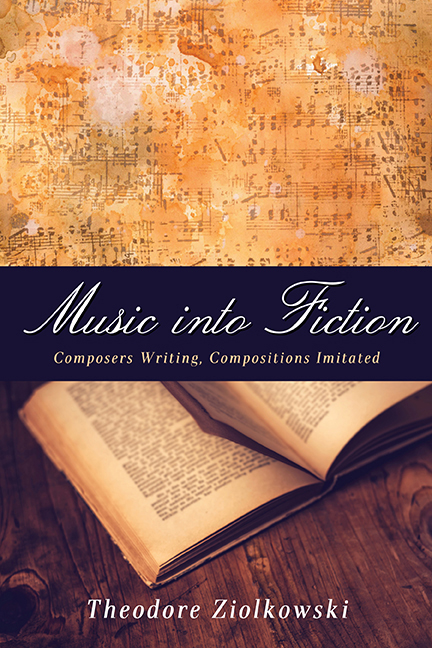Book contents
- Frontmatter
- Dedication
- Contents
- Preface
- Prelude: Introduction
- First Movement: Composers Writing
- 1 Weber and Hoffmann
- 2 Berlioz and Schumann
- 3 Wagner
- 4 Transition: Nietzsche and the Post-Wagnerians
- 5 Burgess
- Second Movement: Compositions Imitated
- Finale: Composers Setting Fictional Compositions
- Coda: Conclusion
- Bibliography
- Index
1 - Weber and Hoffmann
from First Movement: Composers Writing
Published online by Cambridge University Press: 09 May 2017
- Frontmatter
- Dedication
- Contents
- Preface
- Prelude: Introduction
- First Movement: Composers Writing
- 1 Weber and Hoffmann
- 2 Berlioz and Schumann
- 3 Wagner
- 4 Transition: Nietzsche and the Post-Wagnerians
- 5 Burgess
- Second Movement: Compositions Imitated
- Finale: Composers Setting Fictional Compositions
- Coda: Conclusion
- Bibliography
- Index
Summary
Parallel Lives
Ernst Theodor Amadeus (E. T. A.) Hoffmann (1776–1822), the celebrated author of fantastic novels and tales, had a profound and lasting impact on succeeding literary generations in many countries. His works were rapidly translated and received in France by such writers as Baudelaire and Maupassant, in Russia by Pushkin and Dostoevsky, and in the United States by Edgar Allen Poe. His tales are familiar to many, moreover, from Schumann's Kreisleriana (1838), Tchaikovsky's ballet The Nutcracker (1892), and Offenbach's opera Les contes d'Hoffmann (1881). In the twentieth century his continuing presence was assured by Freud's extensive analysis, in his influential essay “Das Unheimliche” (The Uncanny, 1919), of Hoffmann's tale “Der Sandmann” (The Sandman, 1816), which has been repeatedly filmed and staged in Germany. Hoffmann appears as a figure in the historical novel Die Geisterseher (The Spirit-Seers, 1995) by the popular German fantasy writer Kai Meyer. In his acclaimed novel about life in the German Democratic Republic, Der Turm (The Tower, 2008), which is indebted thematically to Hoffmann's social satire of Dresden, Uwe Tellkamp depicts a dramatization of that author's renowned story Der goldne Topf (The Golden Pot, 1814). On this side of the Atlantic, an imaginary uncompleted opera by Hoffmann provides the focal point for Robertson Davies's novel The Lyre of Orpheus (1988), in which the writer's spirit manifests itself as a commentator.
Hoffmann's contemporary Carl Maria von Weber (1786–1826), for his part, has been called “the most influential musician of the nineteenth century.” From Berlioz, Mendelssohn, Chopin, Liszt, and Wagner down to Stravinsky and Hindemith (in his Symphonic Metamorphosis of Themes by Carl Maria von Weber, 1943) Weber has been a powerful presence in the music of the two centuries since his death. The mysterious “Samiel-chord” of Der Freischütz (1821) suggested to Wagner the possibilities of leitmotif; his orchestration inspired Berlioz and Debussy; and his Konzertstück in F minor for Piano and Orchestra (1821) anticipated the compositions of admirers down to Stravinsky's virtuoso Capriccio for Piano and Orchestra (1929). Gustav Mahler completed and scored Weber's unfinished comic opera Die drei Pintos (1888), and Anthony Burgess created an original libretto for his Romantic opera Oberon (1985).
- Type
- Chapter
- Information
- Music into FictionComposers Writing, Compositions Imitated, pp. 11 - 29Publisher: Boydell & BrewerPrint publication year: 2017



